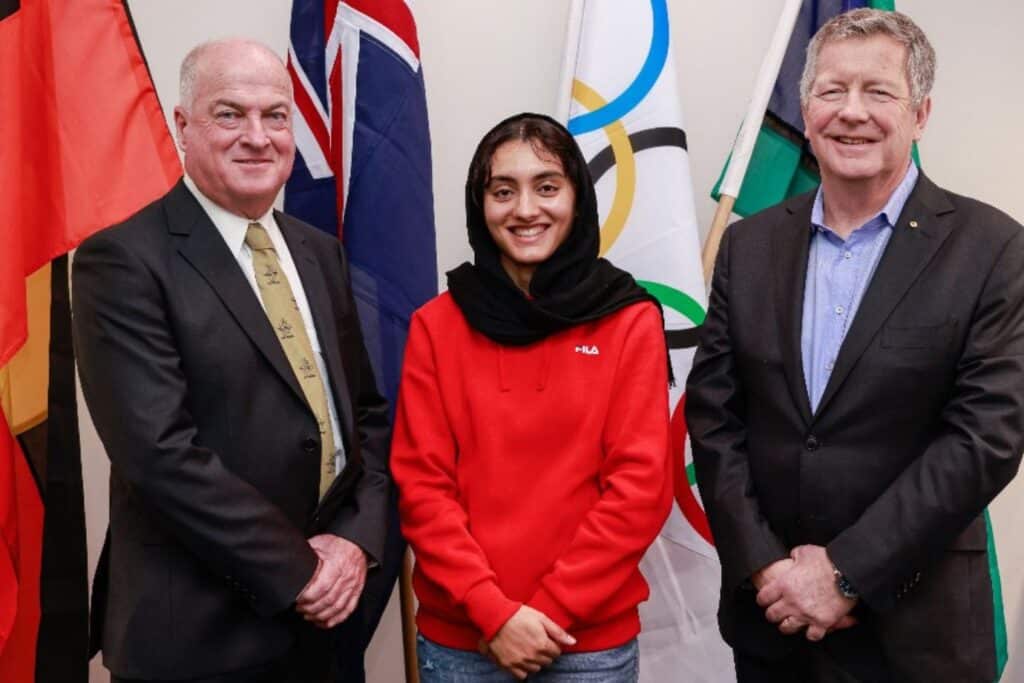Australian-based Afghan athlete Kimia Yousofi has been selected for her third Olympic Games for the 100m sprint event.
Yousofi, the flag bearer for Afghanistan at the 2021 Tokyo Olympic Games, is one of three women athletes who will represent Afghanistan in the Paris 2024 Olympic Games, which will kick off on July 26.
The 28-year-old was relocated to Australia in 2022, after the Taliban seized power of her home country in August 2021. Since then, rights for women and girls have deteriorated significantly in Afghanistan.
Yousofi said her third appearance at the Olympic Games will be dedicated to the women and girls who continue to live under the oppression of the Taliban.
“It’s an honour to represent the girls of my homeland once again,” Yousofi said. “Girls and women who have been deprived of basic rights, including education, which is the most important one.
“I represent the stolen dreams and aspirations of these women. Those who don’t have the authority to make decisions as free human beings. They don’t even have the permission to enter a park.”
Yousofi thanked the Australian federal government and the Australian Olympic Committee (AOC) who helped her and her family escape the Taliban-ruled Afghanistan and move to Australia in 2022.
“I’m also grateful to the Afghanistan Athletics Federation and the Afghanistan Olympic Committee for their support every step of the way,” Yousofi said. “Special thanks to the International Olympic Committee for its support of the Afghan team, Afghan girls, and Afghan athletes, who have always been by our side and made this great achievement possible.”
The journey to her third Olympic games has not been easy for Yousofi. Her coach, John Quinn, acknowledged the extraordinary achievement of Yousofi to get to where she is today.
“On the track she has improved enormously technically since coming here and she has a great squad around her,” Yousofi said.
“But when you consider everything else she has had to juggle – training, a new language, getting her family here, all those things, she has been amazing.
“Her efforts have certainly inspired the other squad members. Now she finds herself on the world stage again in Paris.”
The AOC’s CEO Matt Carroll congratulated Yousofi on her selection and thanked the successive Australian governments and oppositions for their support.
“First, congratulations to Kimia for her hard work since arriving in Australia, settling into a new country and focusing on so many challenges, including her dream of a third Olympic Games,” Carroll said.
“Her story is one of inspiration for women and girls in Afghanistan and anywhere in the world, who are denied basic rights, including the right to freely practice sport.”
The Australian Olympic Committee has congratulated dual Olympian track sprinter Kimia Yousofi, now based in Australia, on her selection in the Afghanistan Olympic Team for the Paris 2024 Olympic Games.
— AUS Olympic Team (@AUSOlympicTeam) July 8, 2024
👉 https://t.co/RJUJSpbfwB@Olympics | @ausgov | @AthsAust pic.twitter.com/SKekENNsMp
This year’s Paris Olympic Games is the first time Afghanistan has had three women athletes in its team. Dr Yonus Popalzay, the President of the Afghanistan Olympic Committee, thanked the AOC for supporting Yousofi to be selected.
“We are delighted having three female athletes for the first time in an Olympic Games,” Dr Popalzay said.
“We highly appreciate AOC for the support extended to Kimia Yousofi. On behalf of Afghanistan NOC please convey our message of gratitude and appreciation to Australian nation and government for support to Afghan in a difficult time.”
Afghanistan had its first woman athlete compete in an Olympic Games just twenty years ago. Martial artist Friba Rezayee competed in judo at the 2004 Athens Olympics.
Earlier this year, Rezayee campaigned for her country to be barred from competing in the Paris Games. In an interview with Reuters, the 38-year old athlete said a decision to allow Afghanistan to compete would be “very dangerous for the people.”
“Given tons and tons of evidence about the Taliban, about their brutal treatment of women and children, they are very dangerous,” Rezayee said.


